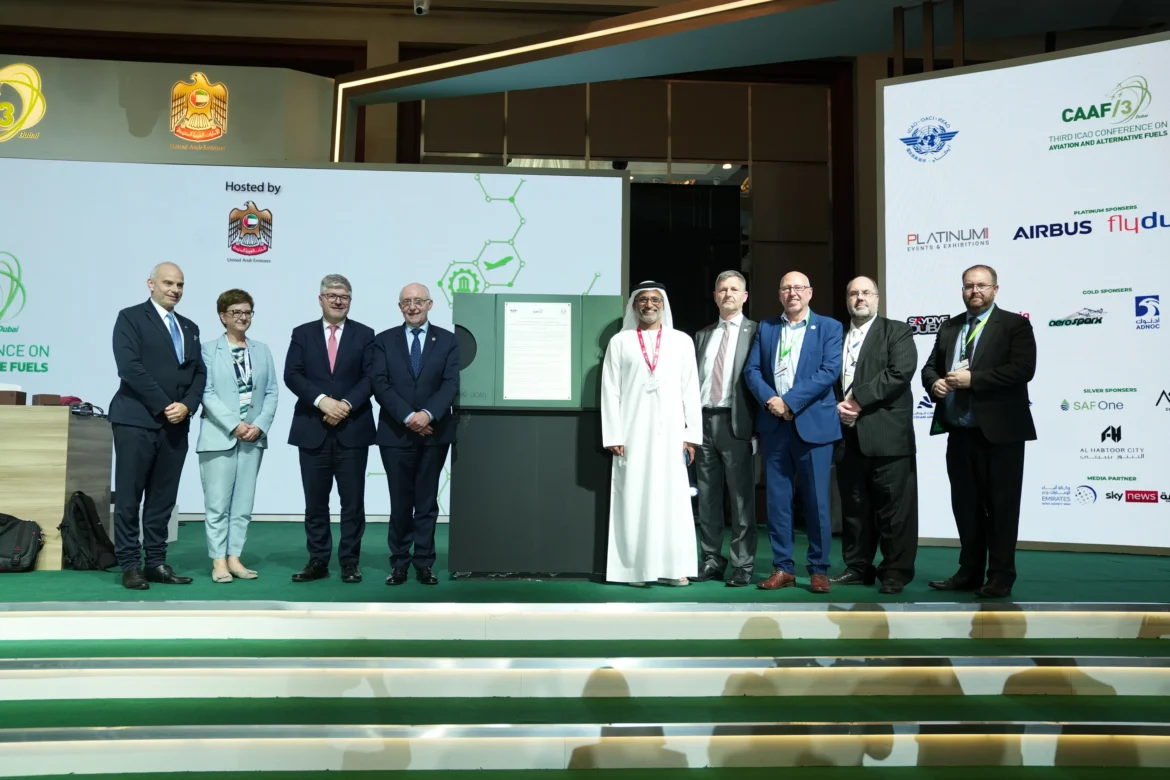On Friday, the International Civil Aviation Organisation (ICAO) announced the adoption of the Dubai Framework, a new ICAO Global Framework for Sustainable Aviation Fuels (SAF), Lower Carbon Aviation Fuels (LCAF) and other Aviation Cleaner Energies.
This took place during the last day of the Third ICAO Conference on Aviation and Alternative Fuels (CAAF/3), held in Dubai and comes a few days ahead of the UN Climate Change Conference (COP28).
In line with the Framework, the ICAO and its member states have agreed to strive to achieve a “collective global aspirational vision” to reduce CO2 emissions in international aviation by 5 per cent by 2030, compared to zero cleaner energy use, by expanding the production of SAF, LCAF and other cleaner aviation energy sources, supported by lowering production costs and providing financing and technology.
ICAO members also agreed to review these goals by 2028 by studying and evaluating global sustainable energy market developments.
The Global Framework was adopted following consultations made across five days, with inputs from over one thousand officials, investors and experts from 100 countries and 30 international organisations.
Key elements of the Framework include:
- A collective vision for the clean energy transition,
- Harmonised regulatory foundations,
- Supporting implementation initiatives, and
- Improved access to financing for related initiatives so that “No Country is Left Behind.”
It will see ICAO and its member states work towards the decentralisation of the production of SAF, LCAF and other aviation cleaner energies across all countries and regions, with the aim of providing a “fair and equal opportunity” to participate across the value chain, from feedstock to fuel production and use.
The Framework states that “no single fuel source will be produced at a level necessary to achieve the long-term global aspirational goal (LTAG)” and that, accordingly, the Framework needs to be “flexible and not exclude any particular fuel source, pathway, feedstock or technology that meets the CORSIA agreed criteria.”
SAFs, LCAFs and other aviation cleaner energies are expected to have the largest contribution to aviation CO2 emissions reduction by 2050, the Framework asserts, which will be supported through a comprehensive approach to be developed by the ICAO and its members, consisting of a basket of measures, including technology, sustainable fuels, operational improvements, and market-based measures.
H.E. Abdullah bin Touq Al Marri, Minister of Economy, said that the Dubai Framework is a “major turning point” in aviation and sustainable and clean fuel production, “ushering in a more sustainable future.”
H.E. added that it would also encourage investments in clean aviation energy, generating fresh investment and economic opportunities, noting that adopting the new Framework provides impetus to global climate action efforts, especially with COP28 a few days away.
Juan Carlos Salazar, ICAO Secretary-General, commented: “We are proud to be a part of this landmark agreement, which acts as a testament to the commitment of the global aviation sector to making a transitional shift and future-proofing our industry, while also boosting the sector’s contributions to Global Development Goals in terms of achieving carbon neutrality and driving sustainable growth model. The Global Framework for SAF, LCAF and other Aviation Cleaner Energies provides a clear roadmap to achieve these goals.”



